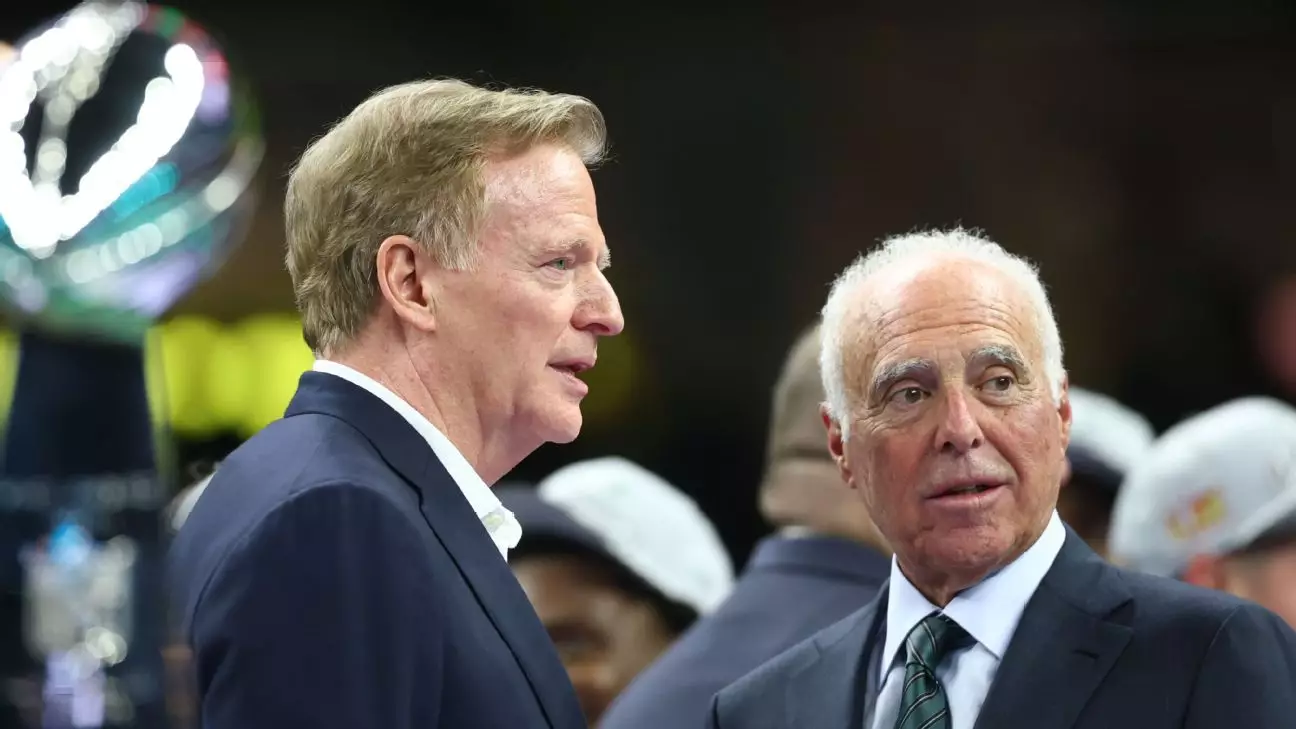The recent debate surrounding the contentious football maneuver known as the “tush push” has ignited a fervent discussion among NFL owners and executives, highlighting a deeper schism within the league that is about more than mere tactics. The incident during the General Session of the NFL meeting in Eagan, Minnesota, serves as a microcosm of a sport grappling with its evolving identity. While some see the tush push as a bold tactical innovation that showcases the game’s physical tenacity, others perceive it as a potential threat to player safety—a narrative that has increasingly dominated the football discourse. That polarization reveals a political and cultural rift amidst the big business of football: between tradition and innovation, safety and aggression.
Jeffrey Lurie’s Passion Project
Philadelphia Eagles owner Jeffrey Lurie epitomized the frustration felt by many who cherish the game’s gritty nature. His impassioned defense during the meeting, including the audacious comparison that likened the play to a “wet dream for a teenage boy,” encapsulates the raw enthusiasm that the sport can instill in its number crunchers and its players alike. Though his metaphor was met with incredulous reactions, it underlined an essential truth: the visceral joy of a spectacular play underlines why so many people are drawn to football. Lurie’s insights, however clumsily articulated, struck at the heart of the debate—the visceral, adrenaline-fueled excitement that defines the game can clash with more staid considerations of safety.
But was his approach effective in moderating the heated discourse? Or did Lurie inadvertently stoke further discontent among the assembly? Once he had concluded, NFL executives such as commissioner Roger Goodell and executive vice president Troy Vincent took exception to Lurie’s remarks, particularly his cavalier use of language in a formal setting that included female attendees. It raises a critical question about inclusivity in football culture. While passionate discourse is vital, there is a fine line between fostering a spirited debate and perpetuating an outdated macho ethos that sometimes translates poorly in diverse company.
Opposing Voices
The variety of responses from other owners signifies the multifaceted nature of viewpoints within the NFL’s boardroom. Jerry Jones of the Dallas Cowboys, who is no stranger to controversy himself, interjected with questions that hinted at conflicting feelings about the tush push. Meanwhile, Buffalo Bills owner Terry Pegula’s ambivalent stance illustrates the tension between personal teams’ advantage and a collective responsibility to prioritize safety and sportsmanship. Each response from these powerful figures reflects not just their individual stances but how fragmented the football community remains regarding this highly innovative play.
And then there’s the emotional resonance attached to the discussion—emotions run high when millions of dollars, countless fans, and a culture are at stake. The lack of unity among the owners reveals that football is as much a cultural battleground as it is a physical one. Whatever the outcome, the votes cast around this issue are emblematic of broader debates about player safety and innovation in sports.
The Decision—A Reflection of the Times
Ultimately, the decision to not ban the tush push—by a narrow vote of 22-10—also illuminates an unwillingness to suppress a signature moment that encapsulates the essence of game-day adrenaline. NFL owners positioned this play not merely as a tactical choice but rather as an emblem of football’s aggressive and theatrical spirit. The tussle over the tush push highlights that this isn’t solely about what players can or cannot do on the field; it’s also about the cultural narratives that underpin America’s most popular sport.
As the game evolves, will it reconcile its fierce competitiveness with a newfound commitment to player well-being? The debate over the tush push serves as a barometer for the broader questions that challenge football today—as the owners argue, the future of the sport hinges upon how it navigates these intense feelings about safety, strategy, and spectacle. The dismissal of the ban may allow the innovative play to flourish in the short term, but the underlying complexities of such discussions are far from resolved.


Leave a Reply